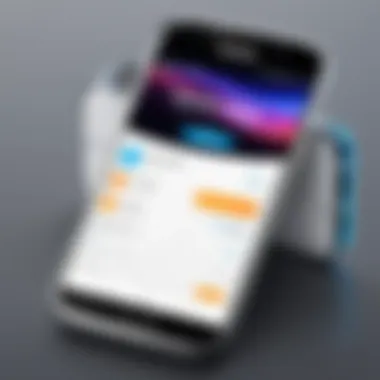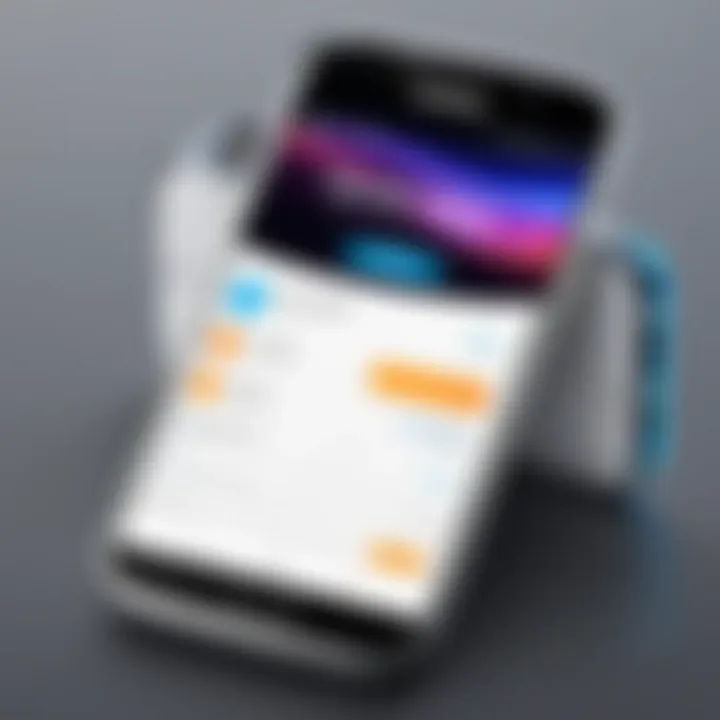Understanding Prepaid Burner Phones: A Comprehensive Guide


Intro
Prepaid burner phones occupy a unique position in the realm of mobile technology. Employed for various purposes, they often raise questions regarding their practicality and legality. This article aims to dismantle the complexities surrounding burner phones. We will delve into their fundamental characteristics, explore the myriad applications they serve, and assess their significance in today's fast-evolving communication landscape.
As privacy concerns grow in an increasingly surveilled world, many individuals seek alternatives that offer discretion and anonymity. Prepaid burner phones are versatile tools that can, under certain circumstances, provide just that. However, their usage is not without some grey areas, particularly regarding legality and ethics. By providing a well-rounded examination of these phones, the reader will be armed with essential insights to navigate the intricacies of this technology and its implications in modern society.
Definition of Prepaid Burner Phones
Prepaid burner phones have become increasingly relevant in today’s tech landscape. Understanding what they are is crucial for anyone considering their use. A prepaid burner phone is typically a mobile device that is purchased without a long-term contract. Instead, users can pay for phone service as needed. These devices allow for communication without the commitment that traditional mobile contracts entail.
Basic Characteristics
Prepaid burner phones possess specific attributes that set them apart. First, they commonly operate on prepaid plans, meaning users can load a set amount of credit for calls, texts, and data. This method provides control over spending. Furthermore, these phones usually come with basic functionalities. Users can make calls and send texts without the complexities of smartphone features. The simplicity appeals to many who do not require advanced tech.
Another vital characteristic is the anonymity they offer. Users can purchase these phones without providing personal information. This feature is attractive to individuals wanting to maintain privacy. Finally, burntout phones tend to have a shorter lifespan, as they are often discarded after a brief period, whether due to dissatisfaction or the conclusion of a specific need.
How They Differ from Regular Phones
The differences between prepaid burner phones and regular phones are notable. Traditional phones typically require long-term contracts, often binding users into extended commitments. In contrast, burner phones offer flexibility. You can buy one, use it for a brief period, or even just specific purposes.
Furthermore, regular smartphones come packed with features, including apps, high-resolution cameras, and internet capabilities. Burner phones focus on the basic communication needs, catering to those who prioritize straightforward use. This can be particularly beneficial in situations where the individual desires a temporary method of communication, such as during travels or personal projects.
Common Uses of Prepaid Burner Phones
Prepaid burner phones serve various significant functions in today's fast-paced world. Their appeal lies in flexibility, allowing users to adapt their phone usage to immediate needs without the long-term committments associated with traditional phone contracts. Understanding these common uses can elucidate why many consumers turn to these devices in specific scenarios.
Temporary Communication
In many situations, such as events or excursions, people may require a means of communication that does not tie them to a long-term commitment. Prepaid burner phones excel in this area by providing an inexpensive way to stay connected temporarily. Whether it is for a short trip, an event like a concert, or even just to keep in touch for a few days, these phones offer the convenience of making calls and sending texts without worrying about ongoing service charges.
"Prepaid burner phones allow users to maintain communication while minimizing risks associated with longer-term contracts."
This approach is particularly beneficial for those who may wish to keep their primary phone number private for certain interactions. Users can activate the burner phone, use it as needed, and then simply discard it when the requirements change.
Privacy and Anonymity
Privacy is a considerable concern in the digital age. Many individuals seek ways to interact without leaving a trace, which makes burner phones an attractive option. These devices enable users to communicate without linking their primary identity to every interaction.
Using a prepaid burner phone reduces the likelihood of personal data being accessed by unwanted parties. For instance, freelance workers or contractors often utilize them to manage work-related communications without exposing their main contact details. This tactic provides a layer of anonymity that cannot be achieved with regular mobile plans.
Travel and Emergency Situations
For travelers, a prepaid burner phone can be a lifesaver. It allows individuals to maintain connectivity in various regions without incurring excessive roaming fees. When abroad, purchasing a local SIM card for a burner phone often proves more economical, affording travelers the capability to communicate without financial stress.
In emergency scenarios, having a dedicated burner phone can be crucial. Even when one’s primary phone may fail due to battery issues or lack of coverage, the burner phone serves as a reliable backup. Carrying a simple device with essential contact numbers can ease panic during critical moments.
In summary, the common uses of prepaid burner phones emphasize flexibility, privacy, and emergency readiness in communication. These factors contribute to their rising popularity among consumers who value their independence and control in an increasingly interconnected world.
Legal Implications of Burner Phones
The discussion surrounding prepaid burner phones naturally leads to the legal implications of their use. As these devices can provide anonymity and privacy, they are often scrutinized by legal authorities. Individuals using these phones should be well-informed about any regulations that may apply in their jurisdiction. Additionally, understanding potential legal risks plays a crucial role in making informed decisions regarding the acquisition and usage of these devices.
Regulations and Compliance
Burner phones fall under various telecommunications regulations depending on the region. In many countries, using prepaid devices does not absolve users from compliance with local laws. For example, providers may be required to maintain certain records, making compliance a complex issue. Users should consider the following:
- Age Restrictions: Some regions impose minimum age requirements for purchasing prepaid phones.
- Identification Requirements: Certain jurisdictions might require identification for activation, even for prepaid services.
- Consumer Protection Laws: Laws that protect consumers apply to burner phones just as they do to traditional contracts, ensuring services are fair and transparent.
Engaging with the laws governing these devices can mitigate potential legal issues. Understanding local regulations is essential for anyone considering the use of a prepaid burner phone.
Potential Misuse and Legal Risks
While burner phones can serve legitimate purposes, their anonymous nature can also attract misuse. This tendency raises a variety of legal risks that users must be aware of. Law enforcement agencies often view these devices with suspicion, which can lead to increased scrutiny. Key concerns include:


- Criminal Activity: Burner phones can be used to facilitate untraceable communication related to illegal activities, from drug trafficking to harassment.
- Privacy Issues: Although these phones offer anonymity, they do not guarantee complete privacy. Legal authorities can still track some usage data under specific conditions.
- Potential for Surveillance: Emerging surveillance technologies might put users at risk, regardless of the anonymity burner phones promise.
Anyone using a burner phone should ensure they understand the risks involved, particularly the implications of using these devices for illegal activities.
Advantages of Using Prepaid Burner Phones
Prepaid burner phones offer several distinct advantages that appeal to a variety of users. Understanding these benefits can help consumers make informed choices regarding mobile communication. These advantages not only reflect on financial aspects but also delve into contractual flexibility and practical usability.
Cost Efficiency
Cost efficiency is a primary reason many individuals opt for prepaid burner phones. Unlike traditional contracts, these phones typically require no upfront payments for devices. Users purchase phones outright, along with plans that can be tailored to their specific needs. Plans often operate on a pay-as-you-go basis, allowing users to spend only on the services they actually utilize. This model avoids the burden of a monthly bill that includes unnecessary charges. For those who use their phones infrequently, this can lead to significant savings over time.
No Long-Term Contracts
Another appealing factor is the absence of long-term contracts. Many cellular providers entrap customers in lengthy agreements that can lead to frustration due to penalties for early cancellation. In contrast, burner phones provide flexible options. Users can activate and deactivate their service without being tied down. This characteristic suits varying lifestyles, especially for people who travel frequently or require temporary solutions. It cultivates a sense of freedom, as consumers are not compelled to remain with a provider if they find their services unsatisfactory.
Simplicity and Ease of Use
Lastly, the simplicity and ease of use of prepaid burner phones is a substantial advantage. These devices are generally designed for straightforward functionality. The user interfaces are often less cluttered compared to advanced smartphones. This can be particularly beneficial for those who value efficiency over intricate features. Setting up a prepaid phone usually requires just inserting a SIM card and following a few prompts. Moreover, operations such as making calls and sending texts do not involve the complexities found in modern smartphones. This user-friendly approach appeals to a broad demographic, from seniors to first-time users.
"Convenience and control are essential when using prepaid burner phones, making them suitable for a diverse audience."
Disadvantages of Prepaid Burner Phones
While prepaid burner phones offer a range of benefits, they come with notable disadvantages that can't be overlooked. Understanding these drawbacks is crucial for users making informed decisions. The limitations associated with prepaid burner phones can affect their effectiveness for certain uses. Recognizing these issues can help users weigh their options and whether such devices fit their communication needs.
Limited Features
One of the most significant challenges with prepaid burner phones is their limited features compared to regular smartphones. Many of these devices are designed primarily for calling and texting. They often lack advanced functionalities like high-resolution cameras, app support, and internet capabilities. This simplicity can be advantageous for some, but it may prove frustrating for tech-savvy individuals accustomed to feature-rich smartphones.
For instance, applications that require constant internet access, such as social media platforms or productivity tools, may not function adequately or at all on these simpler devices. Additionally, many prepaid options do not include features like GPS navigation, which can be essential for users on the go. Users need to assess their feature requirements carefully if they decide to go with a prepaid burner phone.
Lower Call Quality
Another issue tied to prepaid burner phones is the potential for lower call quality. Because these phones often rely on limited cellular networks and budget service plans, the clarity of calls can suffer. Users may experience dropped calls, static, or delays, which can hinder effective communication. This is particularly significant for individuals who need reliable communication for business or emergency purposes.
While some prepaid options might offer decent quality, it is not guaranteed across all providers and models. When deciding on a burner phone, individuals must research vendor ratings and customer reviews, focusing on the specifics of call quality before making a purchase decision.
Short Lifespan of Services
The availability of service with prepaid burner phones can be a significant concern. Many prepaid plans operate under a pay-as-you-go structure, where users pre-purchase service minutes, data, and validity periods. Once these resources are depleted, the user may find themselves with a non-functional device unless they recharge their plan.
This model can be less favorable compared to regular phone contracts that provide a steady monthly service. If a user forgets to add more minutes or data, they could lose access to their only means of communication. Moreover, some prepaid plans come with expiration dates. Thus, if the user does not utilize their phone for a specified time, they may lose all their purchased minutes or data. Therefore, those considering a prepaid burner phone should understand how the lifespan of services can impact their usability in the long run.
"Prepaid burner phones can be effective tools, but their limitations often pose challenges that other smartphones easily overcome."
Key Features to Look for in a Prepaid Burner Phone
When choosing a prepaid burner phone, understanding key features is essential. This section will delve into the features that make a phone better suited to the specific needs of its users. A well-chosen prepaid burner can enhance your communication experience while ensuring both convenience and security. Let’s explore the most critical elements to consider.
Network Compatibility
Network compatibility is one of the most crucial aspects to look for in a prepaid burner phone. Different carriers operate on various networks, such as GSM and CDMA. If you have a specific carrier in mind, ensure your burner phone is compatible with their network. This can directly affect service quality, coverage area, and data speeds.
Moreover, some phones are locked to a single carrier, which limits your options for service providers. Here are a few points to consider regarding network compatibility:
- Unlocking Options: Check if the phone can be unlocked, allowing you to switch networks if needed in the future.
- International Use: If you travel outside your country, a compatible phone can help you avoid exorbitant roaming charges by using local SIM cards.
In summary, a prepaid burner phone’s network compatibility plays a significant role in its usability and efficiency.
Battery Life
Battery life is another critical feature. For users of prepaid burner phones, especially in emergency situations or brief uses, long battery performance is essential. A phone that can last for extended periods without frequent charging is optimal. Some key points to think about include:


- Average Usage: Consider how often you will use the phone. If it is for occasional calls only, a lower battery capacity may suffice. Heavy users should opt for models with larger batteries.
- Battery Saving Features: Look for phones with settings to extend battery life, such as power-saving modes and background app management.
Investing in a phone with solid battery life ensures you remain connected when it matters most.
Durability and Build Quality
Durability and build quality are vital aspects of a prepaid burner phone. While many burner phones emphasize affordability, it should not come at the cost of sturdiness. You want a phone that can withstand casual drops and everyday wear and tear, particularly if it will be used in unpredictable environments. Consider the following:
- Materials Used: Phones made with durable materials, like reinforced plastics or metals, are generally more resilient.
- Water and Dust Resistance: Some models offer ratings for water and dust resistance, providing added assurance for outdoor use.
- Screen Protection: Investigate whether the phone features tempered glass or similar protection against scratches and impact.
"Choosing the right features for your prepaid burner phone enhances not just your comfort but also your overall communication experience"
In summary, when shopping for a prepaid burner phone, focus on these key features: network compatibility, battery life, and durability. Assessing these qualities not only helps satisfy your immediate needs but also prepares you for future requirements.
How to Choose the Right Prepaid Burner Phone
Selecting an appropriate prepaid burner phone requires careful consideration of individual needs and available options. This decision impacts not just functionality but also overall user experience. Thus, understanding various elements involved in the selection process is key.
Assessing Your Needs
When evaluating which prepaid burner phone fits best, start by identifying your specific requirements. Are you looking for basic communication, or do you need features such as camera and internet access? Think about how much you intend to use the phone.
- Calling and texting: If your main usage is calling friends or sending texts, a simplified phone model may suffice.
- Data needs: For those who require access to the internet, consider models that offer data plans. Most prepaid options have limited internet access, so it is important to check compatibility with local networks.
- Durability: If you plan on using the phone outdoors or in tough conditions, look for rugged designs that withstand wear and tear.
Comparing Plans and Providers
Choosing the right plan and provider is as crucial as selecting the device itself. Different service providers offer varying plans that can greatly affect your experience.
- Assessing coverage: Ensure the provider has strong network service in your area. Poor coverage can lead to dropped calls and frustration.
- Evaluating pricing: Various plans come with different pricing structures. Some offer unlimited plans, while others have pay-as-you-go options. Determine which is the most cost-efficient for your needs.
- Reviewing benefits and limitations: Look into what's included in the plans, such as call minutes, text messages, and data limits. Some providers might also offer additional features like voicemail or international calling.
- Customer service options: Research providers based on their reputation for customer service. Efficient support is valuable if issues arise later.
By carefully assessing your needs and comparing plans, you can make a more informed decision that aligns with your personal or practical requirements. Ultimately, this methodical approach helps you avoid unnecessary expenditures and ensures you choose a prepaid burner phone that efficiently serves its purpose.
Privacy Concerns Surrounding Burner Phones
In an age where data breaches and privacy invasions are prominent, understanding privacy concerns surrounding burner phones becomes crucial for users. These phones, while offering an element of anonymity, also raise significant issues. Users need to be aware of how their data is managed, what security measures are in place, and how different regulations affect their privacy.
Data Security
When it comes to data security, prepaid burner phones may seem appealing due to their transient nature. However, they may not always provide the level of protection users think. Many burners rely on public networks, which can expose users to eavesdropping or data interception.
Important considerations include:
- Encryption: Not all burner phones offer encryption for calls and messages, leaving communications vulnerable.
- Storage of Information: Some devices store call logs and text messages, which can be accessed by third parties.
- App Permissions: Users should be cautious with apps, as permissions may allow them to access contacts and locations.
- Provider Policies: Each carrier's data retention policies can differ, so understanding what data is kept is vital for users aiming for privacy.
"With the increasing sophistication of cyber threats, even seemingly secure private communications can be intercepted."
In essence, while prepaid burner phones can provide a layer of privacy, users should approach them with awareness of their vulnerabilities. A thorough examination of the security features and policies of the chosen device is recommended to mitigate risks effectively.
Legal Surveillance
Legal surveillance is another area of concern when discussing burner phones. Despite the assumption that burner phones are completely private, laws in many jurisdictions grant authorities the ability to monitor communications under certain conditions.
Factors influencing legal scrutiny include:
- Law Enforcement Access: In cases involving criminal investigations, authorities may request phone records from service providers, including burner phone data.
- Data Retention Laws: Some countries enforce laws requiring telecommunication companies to retain data for a set period. This can include information from burner phones.
- Scope of Surveillance: With developments in technology, surveillance capabilities have broadened, allowing for more extensive tracking of phone usage patterns, even for disposable phones.
Users must recognize that while burner phones may hide identity, they are not entirely immune to legal oversight. Due diligence in understanding local laws and regulations is advisable to avoid unintended consequences involving privacy.
The Evolution of Burner Phones
The evolution of prepaid burner phones reflects significant changes in technology and consumer needs. Understanding this evolution provides insights into how these devices adapted to various contexts. It reveals both past and current usage patterns and emphasizes the shifting landscape of communication methods.
From Landlines to Mobile


The journey of burner phones began in the era of landlines. Initially, communication relied exclusively on fixed telephone lines. These setups were cumbersome and lacked portability. With advances in technology, mobile communication emerged as a game changer. It allowed individuals to communicate on-the-go. Prepaid phones became accessible, offering a solution especially for those not wanting long-term contracts.
In the early 2000s, innovations led to the birth of mobile prepaid options. These devices were often inexpensive and simple. Users could buy a phone, load it with a specific amount of credit, and use it without extensive setup. This flexibility appealed to various demographics, including travelers and individuals seeking discretion.
Impact of Smartphones
Smartphones have drastically altered the landscape of prepaid burner phones. With the rise of platforms like Apple, Android, and others, consumer expectations changed. People now expect advanced features, internet access, and multifunctionality from their devices, even in budget options. This shift has slightly diluted the identity of traditional burner phones.
As smartphones became affordable, brands began to offer prepaid versions. While these devices still serve the purpose of temporary and anonymous communication, they also allow access to apps and data services. However, this has led to questions about privacy and data security. Users now need to be aware of how their information is handled on more advanced devices.
Recent Trends in Burner Phone Usage
The landscape of prepaid burner phones is shifting. With the rise of technology and creative uses, it's important to explore recent trends. Understanding these trends informs users about their options. It also highlights the reasons why people still turn to burner phones despite the advancements in regular smartphones.
Emergence of New Technologies
Emerging technologies shape how we view burner phones. 5G networks offer faster data speeds, making some prepaid options more appealing. Now, users can enjoy streaming services, social media, and even app usage. This expansion techniques improves user experience and enhances functionality. Many users appreciate the value of having a low-cost phone that can access these new technologies. With the interface of burner phones evolving, users are less likely to view them as basic models.
"Burner phones are no longer just simple call devices. They evolve with our needs and technology."
Additionally, innovations like eSIMs are changing the way customers connect. eSIM technology allows flexibility in choosing networks. Users can switch operators easily without needing a physical SIM card. This adaptability adds value and convenience.
Changing Consumer Behaviors
Consumer habits are shifting in response to privacy and security concerns. As data breaches and surveillance become common topics, people look for ways to protect themselves. Prepaid burner phones are seen as a practical solution. They provide a means to communicate without revealing personal information. This anonymity appeals to varied groups, from those wanting privacy in dating to business individuals needing secure communication.
Social media platforms and messaging apps play into this trend too. Many users opt for this type of phone to manage their online personas more securely. This is particularly relevant for those who want to separate their private lives from their professional ones.
Moreover, the pandemic has caused changes in communication. With remote work rising, many find themselves needing a phone for specific purposes. A prepaid burner phone serves this need well. It provides temporary communication without the fuss of long-term contracts. In essence, they fill a niche role effectively, aligning with modern behaviors that focus on flexibility and security.
In summary, recent trends show a blend of technological advancements and changing consumer expectations. The prepaid burner phone market adapts and evolves in response. Understanding these trends equips potential users with essential insights into making informed decisions.
Practical Tips for Using a Prepaid Burner Phone
Using a prepaid burner phone can offer flexible communication options while maintaining a degree of privacy. To maximize its benefits, it is essential to understand some practical tips that enhance the experience and usability of these devices. This section explores how to set up and manage a prepaid burner phone effectively. Following these tips will help ensure that users can navigate their prepaid phone experience with confidence and efficiency.
Setting Up Your Device
Setting up a prepaid burner phone is typically straightforward, but attention to detail can make a difference. Here are several critical steps to follow:
- Choose the Right Network: Before purchasing a burner phone, verify which carrier offers the best coverage in your area. Major providers such as Verizon, T-Mobile, and AT&T often have different strengths in various regions.
- Insert the SIM Card: Most prepaid burner phones require a SIM card. After buying the phone, insert the SIM card according to the device's instructions to activate service. Ensure the phone is off during this process to avoid potential issues.
- Load Minutes or Data: Depending on the phone, you may need to load minutes or a data plan. Often, this can be done online, in-store, or through a mobile app. Choose a plan that aligns with your expected usage pattern to avoid running out unexpectedly.
- Configure Basic Settings: After activation, you should manage settings like time, language, and network preferences. Completing these tasks ensures that the phone functions optimally and suits your needs.
- Explore Features: Familiarize yourself with the phone’s features, such as call forwarding, voicemail setup, and any additional options available based on the model. Understanding all functionalities can enhance your communication experience.
Managing Your Usage Wisely
Efficient usage management is essential for getting the most out of your burner phone. Here are some strategic tips:
- Monitor Usage: Keep track of your calling, texting, and data usage. Most prepaid services offer tools or apps to help you monitor your consumption. This allows you to avoid overage charges and manage your budget effectively.
- Limit Unnecessary Calls: Use messaging apps such as WhatsApp or Signal for non-urgent communication when possible. These applications can help conserve call minutes and extend the lifespan of your plan.
- Chain of Communication: Consider using the burner phone only for specific purposes or people. This helps maintain a clear boundary between personal and temporary communications and reduces exposure.
- Regular Reloads: Make it a habit to reload your phone when necessary. This ensures that you are always reachable without interruptions and gives you peace of mind when relying on it for important matters.
- Know When to Switch: Evaluate if a burner phone continues to meet your needs. If your situation changes significantly, it may be wise to consider other options, whether that means upgrading the device or terminating the service altogether.
Important: A well-managed prepaid burner phone not only ensures that you stay connected, but also helps maintain your privacy throughout your communications.
Implementing these tips can significantly enhance the efficiency of using a prepaid burner phone. As users navigate their decisions regarding privacy and communication, being informed will lead to better choices and a more satisfying experience.
End
One important aspect is the versatility of these devices. While often associated with anonymity, they function effectively for various practical purposes, such as temporary communication during travel or as a means to protect one's privacy. Additionally, the article outlined essential considerations when selecting a burner phone, emphasizing features like network compatibility and battery life, which can greatly enhance the user experience.
In the context of legal implications, there is a clear reminder of the potential risks linked to misuse. This highlights the importance of being informed about the legal frameworks that govern such devices. Equipped with this understanding, users are not only empowered to make informed choices but also to navigate any associated legal boundaries effectively.
Ultimately, knowing the advantages and disadvantages of prepaid burner phones allows consumers to weigh their options wisely. While they offer anonymity and flexibility, they also come with limitations such as reduced service quality and a lack of advanced features.
In summary, the exploration of prepaid burner phones sheds light on their relevance in today’s fast-paced communication landscape. Once one understands their functions, merits, and risks, one can approach the use of these phones with confidence and clarity.
Final Thoughts on Prepaid Burner Phones
The discussion comes to a wrap with practical takeaways. Prepaid burner phones are not merely tools for anonymity. They play an essential role in various situations, from confidentiality in sensitive communications to cost-effective telecommunications during short-term use.
Emphasizing user responsibility is also vital. Understanding the features and limitations of a prepaid burner phone can dramatically enhance its effectiveness. With the ever-evolving technology landscape, users must stay informed about the latest developments and trends.
"Knowledge empowers the user. A well-informed decision leads to optimal usage of prepaid burner phones."
Regardless of one’s personal connection to technology, embracing the insights in this article allows for better decisions in terms of privacy, security, and usability. When selected and used appropriately, a prepaid burner phone can serve as a powerful tool in today's complex digital world.



